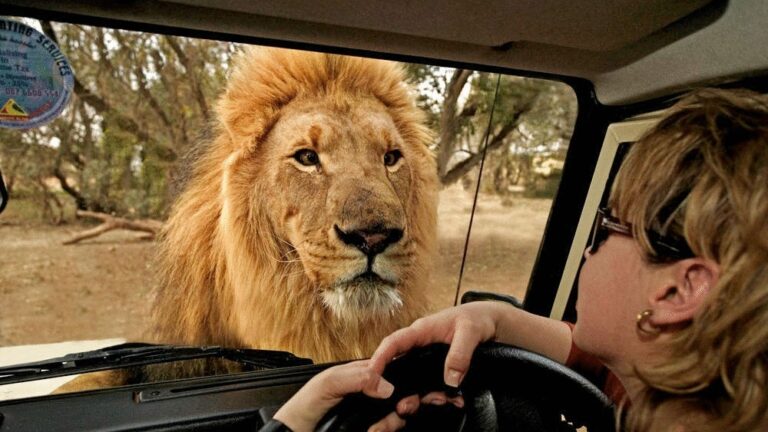Priority List
Traveling to Africa requires a commitment. There is no quick way to reach the continent, and there is no quick way to transit from one city to the other or from one country to the other. Advance planning is a necessity, and this includes time management and a confirmed detailed itinerary.
Africa is not easily accessible for many travelers. The scarcity of public transportation and infrequent airline schedules makes FIT travel challenging, and the limited road signage, sparse roadside assistance (i.e., petrol stations, restaurants and lavatories, emergency services) makes self-drive holidays a test of resourcefulness and flexibility.
Importance of the Safari
In Swahili, safari means “journey,” and an African safari is definitely a journey that brings the amazing world of animals (i.e., lions and tigers, elephants and rhinos) – up close and personal. Historically, safaris were linked with hunting of big game; however, with poaching illegal and conservation and sustainability at the top of travelers’ consciousness, most safaris today focus on observation, and appreciation, with “shooting” limited to photography of animals, landscapes and sunsets. Safaris enable visitors to experience “for themselves” what they have previously seen only on television, in wildlife documentaries, or magazines and books.
Safaris are an important part of the travel industry. There are increasingly large threats to the “natural world,” and the bad guys are anxious to destroy animals, plant life, and pollute the landscape. The focus on “safari tourism,” dedicated to sustainability and the continuation of animal life in the wild, provides the financial resources required by governments and the private sector to maintain the national parks and protect the animals.
Travel Light
Because plans are subject to change without notice, it is imperative to travel light for an African holiday. One carryon suitcase, one handbag (or fanny pack – my personal preference) plus one tote, and you are good to go. From the air to the ground, Africa is a long-haul destination, so comfort is an important consideration when packing.
Select garments that are easy to wash in the hotel sink or tub and quick to dry. The changeable weather (from chilly mornings and evenings to incredibly hot and dry afternoons), layered dressing is the only option. Select one or two favorite short and long sleeve t-shirts (with moisture-wicking), a sleep shirt, a pair of khaki’s (short and long), leggings (short and long), a sweat shirt, cotton scarf, a light water-proof jacket, a pair of sneakers, walking shoes and sandals or flip-flops, multiple pairs of socks, a swim suit and a hat (with a brim), plus a light-weight backpack – then – put all other clothes back in the closet.
Must have: Passport (and in some cases country-specific visas), passport holders, travel Insurance, power adapter (Universal and South Africa), power charger, first aid kit, electrolytes (i.e., powdered Gatorade), sunscreen, wet wipes, toilet paper and/or packages of tissues, hand sanitizer, binoculars and camera, bug repellant, head phones, personal toiletries, vitamins, prescription drugs, antidiarrheal and antacids, Tylenol, aspirin, OTC cold meds, bug repellent and itch relief, sun glasses, a second set of eye glasses, and cash (for tips, border crossings, snacks).
Do not bring: miniskirts or short shorts, unnecessary valuables (leave jewelry, expensive watches at home).
Staying healthy. Avoid tap water; bottled water is available – but – since it is produced from existing water sources, it may not be a perfect beverage for all occasions. Coke and bottled soft drinks provide viable options for staying hydrated. Unless you are a guest at a luxury resort / safari camp, avoid ice cubes and fresh fruits/vegetables.
Planning
Many visitors to Africa have been thinking about the journey from their early childhood. Perhaps they saw the Lion King, or wanted to see where the zoo imprisoned lions, tigers and elephants were born.
Short of clinging to your sofa, there are always risks associated with travel; however, an African journey is no more or less safe than visits to other parts of the planet. The precautions necessary to be safe at the mall are the same skill-sets that work internationally.
It may be the remoteness of African safari lodges and tented camps that are typically distant from cities, but the reality is that these properties are usually very well guarded, and crime is slim.
It is important to remember that Africa is not a zoo. Visitors are guests in safari parks and it is important for visitors to respect their hosts and the terrain. Stay in the van, truck or 2WD and follow directions of the guide.
As well-mannered travelers, it is considerate to mute conversations; animals scare easily, and a pride of lions may not approach because the sounds from your group are making them nervous. Do not expect to see every animal on any one safari, remember that animals do not have timetables. At all times, keep your eyes open and camera ready. Frequently the guide will have the group do nothing but sit quietly in the van and wait for the animals to come visit them.
Listen. Small animals and birds are communicating with each other and if they go silent, it could mean that a lion is nearby.
Boundaries
Crossing from one African country to another is not as easy as traveling through the United States or Europe. Each country maintains its own border and expects that its rules and regulations, fees and protocols will be respected and followed. It is during these moments that the skill-set of an experienced local guide is important as it is this person, with personal relationships with law enforcement, who will assist in expediting the passport/fee process.
This is not the time to ask questions and under most circumstances, not the time to take photos. Some of the government employees may be “camera shy,” and resent being part of your holiday photo collection. Be prepared with cash and credit cards to cover border crossing fees, which appear to be flexible.
Paperwork
Prior to embarking on the journey, make sure that all passports, visas, medical records are in order. Passports must be valid for at least 6 months after your return home date (9 months is recommended). Visitors to South Africa are required to have 2 blank pages in their passport (in addition to the 2 endorsement pages in US passports). Traveling to more than one African country via South Africa? Travelers must allow for sufficient pages for each country visited and have at least 2 blank visa pages for each re-entry to South Africa.
Traveling with children requires extra vigilance. In addition to valid passports for the parents and children, there may be a need for the child’s birth certificate listing the names of both parents (original documents or certified copies of the original). If the child is traveling with only one parent, the child may also need a letter (affidavit not older than 4 months) stating parental consent. Based on country of origin, there may be other documents required by the African nations. Check and double check before leaving home. If the required documents are not produced at the airports and border crossings, passengers may not be permitted to continue their journey.
Join the Group (or Not)
All groups are not created equal. Unless you have a huge budget and can arrange for a private tour guide to lead you through airports, assist in border crossings, and arrange ground transportation from one safari lodge/camp to the next, you will be part of a group. Groups are randomly organized, and people are brought together as a result of the date and time of their visit and/or the number of people who can be accommodated in the van or on the boat.
Most visitors to Africa are traveling with at least one other person: it could be a spouse, a significant other, or BFF, while others use the “once in a life time trip” to gather dozens of family members or college classmates together.
If you are traveling solo, you are likely to be tossed randomly into a group – just because there is a seat available or a pre-scheduled person opted out at the last minute. Traveling with a group of strangers requires compromise (from your side). Not everyone gets to have a window seat, and if you are traveling solo, it is unlikely you will get first choice of anything (stopping for a snack, bathroom breaks, shopping opportunities). If compromise and flexibility is not part of your skill-set, arrange for a private vehicle and take the opportunity to pursue your own interests at your own pace.
Etiquette
1. Be ready and be on time. Visit the toilet, pack the camera and hand wipes before heading to the van. It is polite to arrive a few moments early so the tour guide knows where you are and does not have to call her hotel room.
2. Be prepared to respect the interests of the group; hopefully they will return the courtesy.
3. Use your indoor voice and speak in moderation. Do not drive the game driver or other members of the group insane with constant questions or comments.
4. Avoid sudden movements or standing up in the van when close to the animals as these actions may startle them. Rocking, unnecessary or unexpected movements may also prevent a member of the group from getting their “perfect” photo.
5. Patience is a virtue. There are no timetables or scripts on safari. Waiting may be part of the adventure. Do not be the first one to grab the bottle of water, jump out of the van for the bathroom or grab the first sandwich.
6. Be prepared. Bring your own water bottle, sun screen, hat, binoculars, camera, layers of clothing and hand sanitizer. The guide may have these supplies as back-ups, but guests are expected to bring their own.
7. Families with children must accept the fact that not everyone in the group will think the children are as wonderful as you know they are. Be mindful of the other members of the group. If your children are unlikely to be calm and patient in light of the exciting safari, it may be advisable to arrange for your own vehicle.
8. Gratuities. Do not forget to tip your guides, drivers, camp staff and others on safari. Tips are an important part of the staff’s income.
Go2Africa
Tour operators, and travel agents are optimistic about the future of Africa. The World Bank encourages consideration of the region for investments and points to the need for new partnerships between governments, development partners and the private sectors. The World Bank reported (2012) that tourism accounts for 8.9 percent of East Africa’s GDP, 7.1 percent of North Africa’s, 5.6 percent of West Africa’s and 3.9 percent of Southern Africa’s. Tourists can assist in African growth by visiting Africa, supporting the myriad tourism products, and encouraging others to travel with them in support of economic growth.
© Dr. Elinor Garely. This copyright article, including photos, may not be reproduced without written permission from the author.





